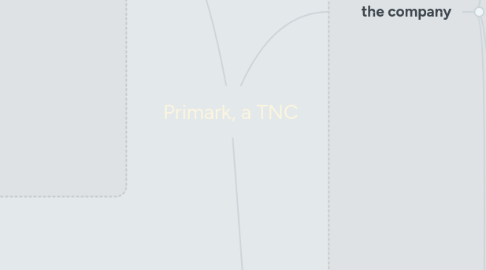
1. the company
1.1. production
1.1.1. manufactures clothes in India, Bangladesh, China, Vietnam, Sri Lanka (LEDCs, NICs, RICs --> lower costs)
1.1.2. buys cotton from Pakistan, Benin, Uzbekistan (LEDCs)
1.1.3. Modo: lower costs, increase sale Numbers
1.2. spacial organization
1.2.1. based in Ireland (headquarters)
1.2.2. 368 stores (UK, Belgium, Germany, Portugal and more)
1.3. workers (terrible working conditions)
1.3.1. gender inequality
1.3.1.1. India: women & girls are LEGALLY paid less than men & boys
1.3.2. no maximum hours --> some work up to 80h/week in Bangladesh
1.3.3. no holiday or sick pay
1.3.4. accidents: in 2013, Bangladesh, a factory collapsed --> 450 killed
1.3.5. insufficient attention to health and safety factors
1.3.5.1. wellbeing not ensured: member of Leather Working Group (promotes sustainable practices in the leather industry -> use of leather and wool without stating their sources which does not guarantee the wellbeing of those workingf in the factory)
1.3.6. child labor
1.3.6.1. India
1.3.7. 75 % of respondents think that the workload is too high
1.3.8. very low wages
1.3.8.1. France: labour unions want Primark to pay higher wages,
1.3.8.1.1. Primark proposed 1 c/hour wage increase for sales people and 9 c/ hour increase for managers --> adjusted to 4 and 13 cents respectively ->French labour unions still feel those numbers are insufficient
1.3.8.2. Bangladesh: 7 pennies/hour
1.3.8.3. improvement on labor rights
1.3.8.3.1. brand is a signatory to the Bangladesh Accord on Fire and Building Safety and the Cotton Pledge
1.3.8.3.2. member of the Ethical Trading Initiative (ETI)
1.3.8.3.3. adopted the Code of Conduct (but does not ensure payment of a living wage)
1.3.9. Staff intimidation/mistreated
1.3.9.1. they feel belittled, intimidated when they call in sick
1.3.9.1.1. risk losing pay if they are sick
1.3.9.2. under the continuous watchful eye of the supervisors, managers and cameras -->40% are worried the abundance of cameras invades their privacy + images not always properly used
1.3.9.3. managers and supervisors are constantly rushing them
1.4. Basic information
1.4.1. founded in 1969 in Dublin
1.4.2. belongs to Associated British Foods
1.4.3. income: $1.7 billion/year
1.4.4. more than 300 stores/number of locations
2. Environmental policy
2.1. 'fast-fashion'
2.1.1. mass production (+ low wages)
2.2. insufficient attention paid to the protection of the environment due to mass production
2.2.1. "minimal greenhouse gas emissions reduction initiatives beyond energy effiency": no reduction target set
2.3. clothes' means of transportation
2.3.1. large container ships --> carbon emissions -> global warming
2.4. now has a team of 80 experts dedicated to sustainability
2.4.1. paper pags instead of plastic bags since 2002
2.5. Sustainable Cotton Programme
2.5.1. The farmers have seen lower fertiliser, pesticide and water usage, in year three they used 40% less fertiliser, 44% less pesticide and 10% less water when compared to the control farmers.
2.5.2. As cotton farming tends to support five people in each household, the benefit of this programme alone is thought to have reached over 26,000 people in rural India.
2.5.3. Primark has set out a long-term ambition to ensure all the cotton in its supply chain is sustainably and responsibly sourced.
2.5.4. Partnership with CottonConnect
2.5.4.1. CottonConnect is an entreprise aiming to transform the cotton industry by making it more sustainable.
3. Impact on countries
3.1. economically
3.1.1. use of local labor
3.1.2. more jobs
3.1.2.1. cleaning, catering services
3.1.2.2. Bangladesh: earned £125 billion in exports to Primark
3.1.3. governments earn more from wages and sales
3.1.4. more expensive machinery and technologies
3.1.4.1. widening gap between economically developped and less developped countries --> because the GNP increases less quickly than the home company's headquarters
3.1.5. image of a region improves --> other businesses are attracted to it
3.1.6. outflow of wealth --> most profits go to Ireland
3.1.7. Decline of consummation due to scandals
3.1.7.1. Shopper claims to have found a cry for help note inside trousers alleging slave labour conditions
3.1.7.2. Human bone found in sock in a store in Essex; investigations are still ungoing
3.2. socially/ethically
3.2.1. possible massive unemployment --> decisions in the home country -> company could pull off at any time
3.2.2. infrastructure
3.2.2.1. roads, airports, services improved
3.2.2.2. houses and buildings constructed
